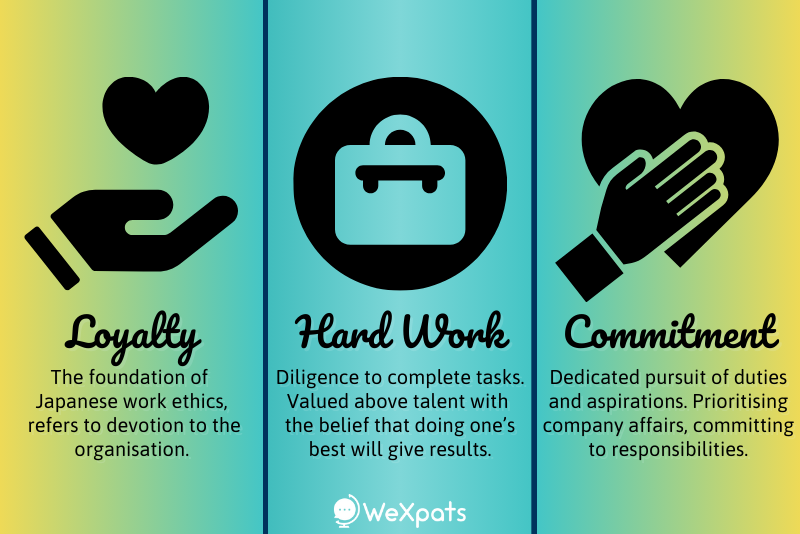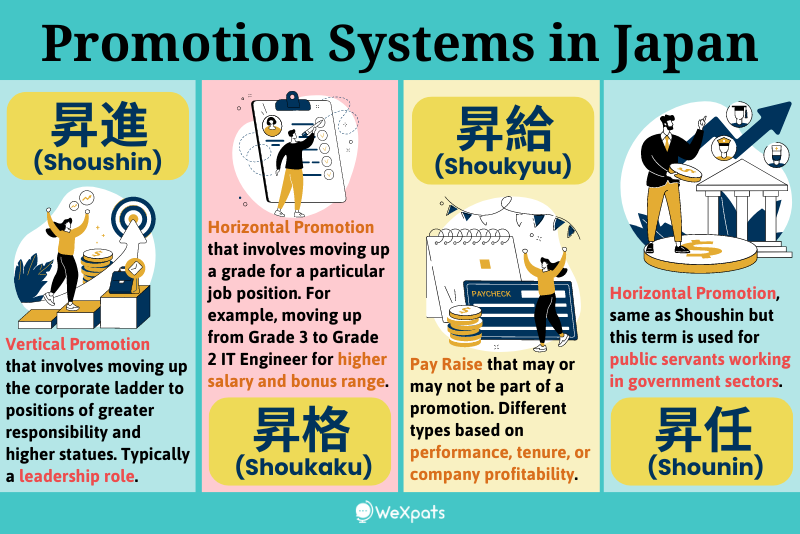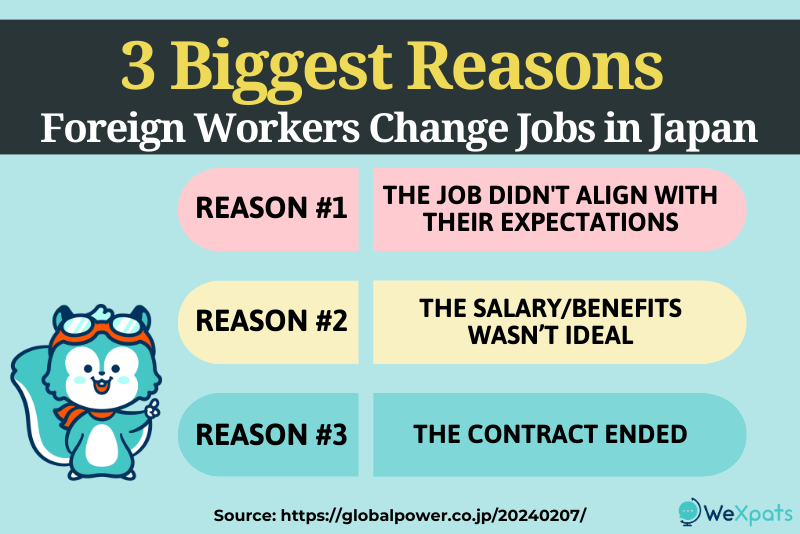社内昇進 (Shanai Shoushin) is “internal promotion”, one of Japan’s work cultures. Learn what characteristics in employees are valued in order to gain a promotion in Japan.
First Published: 2020-10-26
Updated: 2024-06-08
Table of Contents
- What is Shanai Shoushin (社内昇進)?
- Core Values in Japanese Work Culture
- Promotion Systems in Japanese Corporations
- 昇進 (Shoushin) - Vertical Promotion
- 昇格 (Shoukaku) - Horizontal Promotion
- 就任 (Shuunin) - Diagonal Promotion
- 昇任 (Shounin) - Public Servant Promotion
- 昇給 (Shoukyuu) - Pay Raise
- Criteria for Shanai Shoushin, Promotions in Japan
- Get Help Changing Jobs in Japan with WeXpats
 Are you having any issues with job-hunting in Japan?
Are you having any issues with job-hunting in Japan?
What is Shanai Shoushin (社内昇進)?

Shanai Shoushin (社内昇進) is Japan’s “internal promotion” system. The breakdown of the Kanji is as follows:
- 社内 (Shanai) meaning “internal company” or “in-house”
- 昇進 (Shoushin) meaning “promotion”
Shanai Shoushin is a fundamental aspect of promotion in Japanese work culture. It reflects the value placed on loyalty, seniority, and internal development within a company. Promotions are typically based on a combination of tenure, performance, and adherence to company values.
Understanding Shanai Shoushin is essential to comprehending how Japanese companies maintain stability and continuity through their workforce. It is also important to know what is valued for Shanai Shoushin for practical purposes, such as aiming for your own promotion when working in Japan.
There are many reasons including earning a higher salary to support your family back home, the substantial employee benefits and social welfare, a relatively safe and peaceful country to live in, and more.
Writer's Pick
Core Values in Japanese Work Culture

Core values in Japanese work culture include loyalty, hardwork and commitment that is applied at Japanese workplaces through specific practices, including Shanai Shounin.
Loyalty
Loyalty to the company is one of the foundations of Japanese work ethics. It refers to devotion to the organisation shown through obedience, hardwork and commitment and reflected through long tenure and lifetime employment.
Hard Work
Hard work or diligence is greatly valued in Japanese work culture, more so than talent. This stems from the belief that doing one’s best will eventually show results. It also ties closely with loyalty, as one’s loyalty can be observed through working hard.
Commitment
Commiting to pursuing one’s duties and responsibilities to the company is highly valued in Japanese work culture. Commitment can be seen through one’s hard work and prioritising of a company's affairs.
Read more about the three pillars of Japanese work ethics here. We also address the social concerns that are a consequence of Japanese work ethics.
Promotion Systems in Japanese Corporations

There are several types of promotion systems in Japanese work culture.
昇進 (Shoushin) - Vertical Promotion
Shoushin is a vertical promotion that involves moving up the corporate ladder to positions of greater responsibility and higher status. This type of promotion is typically associated with increased managerial duties and leadership roles. It reflects an employee’s growth in expertise and leadership capabilities.
昇格 (Shoukaku) - Horizontal Promotion
Shoukaku is a horizontal promotion. In Japan, it is common for some companies to have set ranges of grades corresponding to a particular job position. For example, the same IT engineer position comes in Grades 1, 2 and 3. Being promoted up a grade comes with higher salary, bonus, and position in the company, but not necessarily any changes in duties. It reflects an employee’s growth in expertise.
就任 (Shuunin) - Diagonal Promotion
Shuunin means “to assume (position)”. The term can also be used to say “take up office” in reference to a new job and not a promotion. In the context of promotions, Shuunin is a diagonal promotion that involves being promoted to a completely different role and responsibility, perhaps a different department altogether. It reflects an employee’s skills and expertise that are better served as well.
昇任 (Shounin) - Public Servant Promotion
Shounin is the same as Shoushin (horizontal promotion), but is a term more commonly used in government sectors for public servants. Shoushin is the term used in private corporations.
昇給 (Shoukyuu) - Pay Raise
Shoukyuu refers to salary raises that may or may not be accompanied by promotions. They may be awarded based on performance, tenure or company profitability. It reflects recognition of an employee’s contributions and is important for employee motivation and retention.
Shoukyuu comes in many forms in Japan:
- Regular Pay Raise (定期昇給): a fixed pay raise every year
- Temporary Pay Raise (臨時昇給): a temporary pay raise due to company profitability
- Appraisal Pay Raise (考課昇給): a pay raise based on work and performance evaluation
- Ordinary Pay Raise (普通昇給): a pay raise based on improved work performance within the scope of employee’s duties
- Special Pay Raise (特別昇給): a pay raise awarded due to special achievements and results
Criteria for Shanai Shoushin, Promotions in Japan

Promotions in Japan are based on a combination of factors which we will introduce below.
Length of Service
As previously mentioned, loyalty is valued and rewarded in Japan. As such, tenure and seniority in a company often means prioritisation when it comes to promotions.
Performance
Consistent high performance and contributions to the company’s success is essential. Nowadays, modern companies are more likely to offer promotions based on performance more so than seniority. An improvement that offers better opportunities and career advancement to the younger generation.
Teamwork
Group harmony is one of the most important aspects valued in Japanese work culture. As such, how well you work as a team and your relationships with coworkers are taken into account during promotion evaluations.
Continuous Improvement
Embodied in the principle of Kaizen (改善), active pursuit of personal and professional development is an important factor for promotion evaluations.
Understanding these criteria helps in grasping the nuanced and multifaceted approach to promotions in Japanese work culture, where both individual and collective growth are valued.
Get Help Changing Jobs in Japan with WeXpats

If getting a promotion in your current company seems too far-fetched, there is always an option to change jobs. According to a survey conducted by Global Power, some of the biggest reasons foreign workers change jobs in Japan is because salary and benefits are not ideal and the job doesn't align with their expectations. In many situations, simply changing jobs can increase your salary.

WeXpats Agent is a career support service that specialises in employment for foreign nationals living in Japan.
Recruitment agencies in Japan are a service where dedicated career advisors will assist you with your job hunt for free. In addition to introducing open positions, we also provide support to help you create your Japanese resume and practice for interviews. Worried about job hunting in Japanese? We are here for you.
Features of WeXpats Agent
-
We have many job openings that are a good fit for foreign nationals to work in, such as translation, interpretation, inbound, etc. jobs that make use of your language skills, as well as engineering etc. jobs that do not require Japanese skills.
-
Our career advisors support and help you prepare your resume and practice job interviews with you. Clearly communicate your strengths to the hiring company.
-
We will handle communication with companies on your behalf, such as arranging interview dates and negotiating conditions. And thereby reducing your stress and time spent.


































